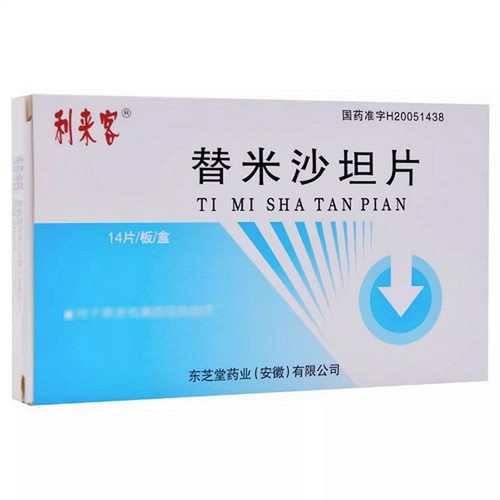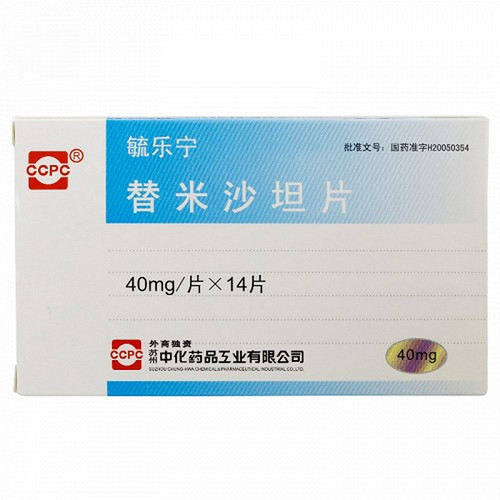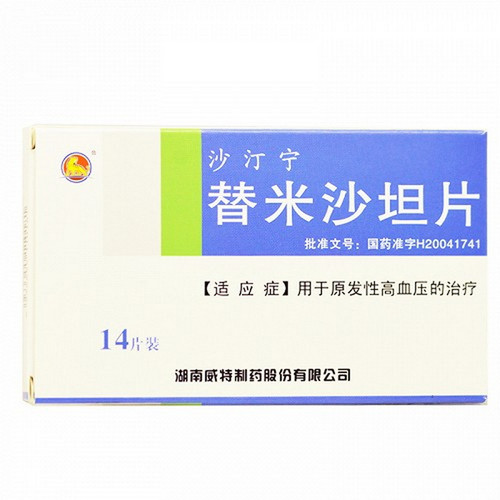Product Overview
[Drug Name]
Generic Name: Telmisartan Tablets
Trade Name: Suniya
English Name: Telmisartan Tablets
Chinese Pinyin: Timishatan Pian
[Ingredients]
The main ingredient of this product is telmisartan, also known as 4-[(1,4-dimethyl-2-propyl[2,6-di-1H-benzimidazol-1-yl)methyl]-[1,1-biphenyl]-2-carboxylic acid.
[Properties]
This product is white tablets.
[Indications]
For the treatment of essential hypertension.
[Dosage and Administration]
Adults: 40mg-80mg once daily. Dosage is not affected by diet. No dosage adjustment is required for patients with mild or moderate renal impairment or the elderly. For patients with mild or moderate hepatic impairment, the dosage should not exceed 40mg/day. For children: Safety and efficacy data for this product have not been established.
[Adverse Reactions]
Over 3,700 patients were evaluated for safety, including 1,900 treated for more than six months and over 1,300 for more than one year. Adverse reactions were generally mild and resolved spontaneously, with very few requiring discontinuation. In placebo-controlled trials, including 1,041 patients treated with telmisartan at various doses (20 to 160 mg) for more than 12 weeks, overall adverse reactions were similar to those in the placebo group. The incidence of adverse reactions was 1% higher than in the placebo group. Adverse reactions, which occurred at a 1% higher rate than in the placebo group, included flu-like symptoms, dyspepsia, myalgia, urinary tract infection, abdominal pain, headache, dizziness, pain, fatigue, cough, hypertension, chest pain, nausea, and extremity edema. In the placebo-controlled trials, 2.8% of the 1,455 patients treated with telmisartan discontinued due to adverse reactions, compared with 6.1% of the 380 patients treated with placebo. The incidence of adverse reactions was not related to dose, gender, age, or race. In six placebo-controlled trials, the incidence of cough in the treatment group and the placebo group was the same at 1.6%. In addition, among the 3,500 patients taking telmisartan, 0.3% of the patients experienced adverse reactions. The specific circumstances are as follows, but it cannot be said that these adverse reactions are related to taking telmisartan: Autonomic nervous system: impotence, sweating, flushing; Systemic: allergy, fever, leg pain and feeling unwell; Cardiovascular: palpitations, dependent edema, angina, tachycardia, leg edema and abdominal ECG; CNS: insomnia, drowsiness, migraine, dizziness, paresthesia, spontaneous muscle contraction, decreased sensation; Gastrointestinal: flatulence, constipation, gastritis, Vomiting, dry mouth, hemorrhoids, gastroenteritis, enteritis, gastroesophageal reflux, toothache, nonspecific gastrointestinal discomfort; Metabolism: gout, high blood cholesterol, diabetes; Muscle and bone: arthritis, joint and leg pain; Nervous: anxiety, depression, nervousness; Immunity: infection, fungal infection, suppuration and otitis media; Respiratory system: asthma, bronchitis, rhinitis, dyspnea and epistaxis; Skin: dermatitis, rash, eczema and pruritus; Urinary system: frequent urination, cystitis; Vascular: cerebrovascular disease; Special senses: visual abnormalities, conjunctivitis, tinnitus and earache. There is a report of angioneurotic edema.
[Contraindications]
Telmisartan tablets are contraindicated in patients who are allergic to this product or any of the excipients of the tablets.
[Precautions]
(1) Hypovolemic patients need to be corrected or used under close observation. (2) Liver function impairment: Telmisartan is mainly excreted through bile secretion. Patients with cholestasis or liver dysfunction have decreased clearance. Telmisartan should be used with caution in these patients. When the adjusted dose is less than 40 mg, drug replacement should be considered. (3) Renal function impairment: Inhibition of the renin-angiotensin-aldosterone system (RAAS) may cause changes in renal function in susceptible individuals. When a patient's renal function is related to RAAS (such as when a patient has congestive heart failure), treatment with angiotensin-converting enzyme inhibitors and angiotensin receptor antagonists may cause oliguria and/or progressive azotemia, and occasionally acute renal failure and/or death. Patients receiving telmisartan may experience similar conditions. Studies on patients with unilateral or bilateral renal artery stenosis treated with ACEI have shown that patients have elevated serum creatinine or blood urea ammonia levels. There is no data on long-term use of telmisartan in patients with unilateral or bilateral renal artery stenosis. Patients receiving telmisartan may experience conditions similar to those with ACEI.
[Use in Special Populations]
Precautions for Children:
Safety and efficacy data for this drug have not been established for children and adolescents under 18 years of age.
Precautions for Pregnancy and Lactation:
1. Use during Pregnancy: Insufficient data exist to indicate whether this drug can be used in pregnant women. Animal studies have not shown teratogenicity, but have shown embryotoxicity. Therefore, as a precaution, telmisartan should not be used during the first three months of pregnancy. Appropriate alternative therapies should be adopted before pregnancy is planned. During the second and third trimesters of pregnancy (during the second and third trimesters), drugs that directly act on the renin-angiotensin system can cause fetal harm or even death. Therefore, telmisartan is contraindicated. Once pregnancy is confirmed, this drug should be discontinued as soon as possible.
2. Use during Lactation: Because it is unknown whether this drug is excreted in breast milk, this drug is contraindicated during breastfeeding.
Precautions for Elderly: No dose adjustment is required for this drug.
[Drug Interactions]
1. Concomitant use of lithium and angiotensin-converting enzyme inhibitors can cause reversible increases in blood lithium levels and toxic reactions. There have also been isolated cases of this condition caused by the combined use of lithium and angiotensin II receptor antagonists. Therefore, caution is advised when coadministering lithium with this product. If coadministration is necessary, blood lithium levels should be monitored during coadministration. 2. Some drugs can affect blood potassium levels or cause hyperkalemia (such as ACE inhibitors, potassium-sparing diuretics, potassium supplements, potassium-containing salt substitutes, cyclosporine A, or other drugs such as heparin sodium); monitoring of blood potassium levels is recommended if this product is coadministered with these drugs. Based on experience with other drugs that affect the renin-angiotensin system, coadministration of this product with these drugs may increase blood potassium levels (see Precautions). 3. Pharmacokinetic studies have investigated the interaction of this product with digoxin, warfarin, hydrochlorothiazide, glyburide, ibuprofen, paracetamol, amlodipine, and other drugs. It can increase mean digoxin trough blood concentrations by 20% (in some cases by 39%), so digoxin plasma concentrations must be monitored. 4. This product may enhance the antihypertensive effect of other antihypertensive drugs. Other clinically significant interactions have not been confirmed. 5 Based on their pharmacological properties, the following drugs may potentiate the antihypertensive effects of antihypertensive drugs, including telmisartan: baclofen and amifostine. Additionally, alcohol, barbiturates, sedatives, hypnotics, or antidepressants may enhance the orthostatic hypotensive effect. 6 When coadministered with telmisartan, the Cmax of simvastatin metabolite (simvastatin acid) was slightly increased (1.34-fold) and its elimination was accelerated.
[Pharmacological Action]
Angiotensin I (AI) is catalyzed by angiotensin-converting enzyme (ACE, kininase II) to angiotensin AII. AII is the primary pressor of the renin-angiotensin system (RAS), with effects such as vasoconstriction, stimulation of aldosterone synthesis and release, cardiac stimulation, and renal sodium reabsorption. Telmisartan selectively blocks the binding of AII to AT1 receptors on most tissues (such as vascular smooth muscle and adrenal glands), thereby inhibiting the vasoconstrictive and aldosterone-secreting effects of AII. AT2 receptors are also present in most tissues, but the cardiovascular effects of AT2 are still unclear. Telmisartan binds to AT1 with a much higher affinity than AT2 (over 3000 times).
Storage: Store at room temperature, away from light, and sealed.
Specifications: 40mg x 14 tablets
Packaging: Box
Expiration Date: 24 months.
Approval Number: National Medicine Standard H20050996
Manufacturer: Beijing Fuyuan Pharmaceutical Co., Ltd.
Abbreviation: Beijing Wansheng Pharmaceutical







